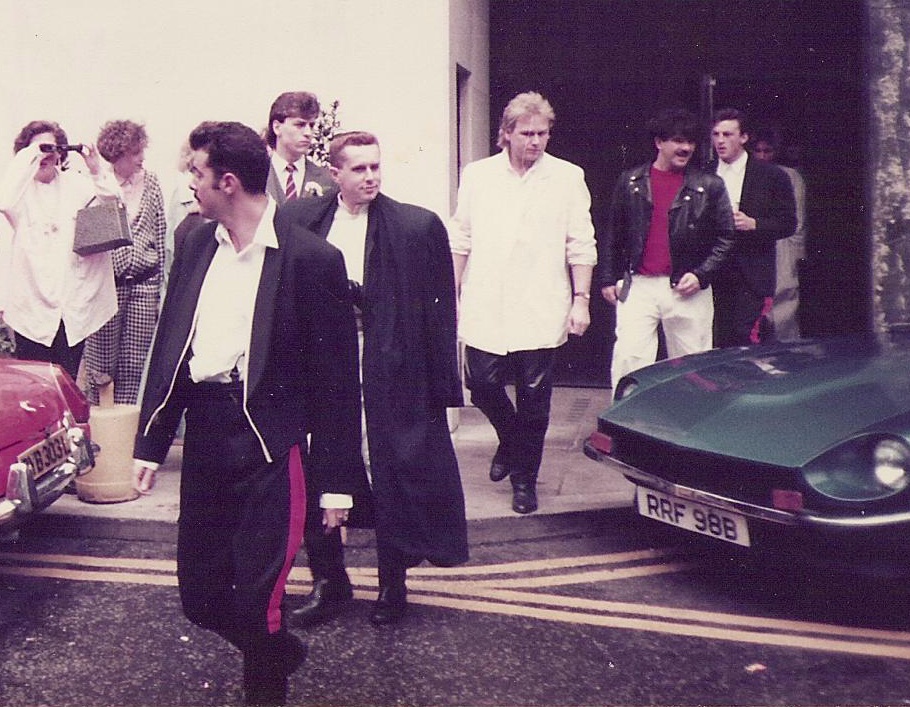
Frankie Goes to Hollywood
Frankie Goes to Hollywood were an English pop band that formed in Liverpool in 1980. They comprise Holly Johnson (vocals), Paul Rutherford (backing vocals), Mark O'Toole (bass), Brian Nash (guitar) and Peter Gill (drums). They were among the first openly gay pop acts and made gay rights and sexuality a theme of their music and performances.
For the video game, see Frankie Goes to Hollywood (video game).
Frankie Goes to Hollywood
Liverpool, England
- 1980–1987
- 2004–2007
- 2023
- Holly Johnson
- Paul Rutherford
- Mark O'Toole
- Brian Nash
- Peter Gill
- Jed O'Toole
- Ryan Molloy
Frankie Goes to Hollywood signed to ZTT Records in 1983. Their debut album, Welcome to the Pleasuredome (1984), produced by Trevor Horn, achieved advance sales of more than a million, and their first three singles, "Relax", "Two Tribes" and "The Power of Love", reached number one on the UK Singles Chart. Their provocative themes led them to be briefly banned by the BBC, drawing further publicity. In 2014, the music journalist Paul Lester wrote that "no band has dominated a 12-month period like Frankie ruled 1984".[6]
Johnson, Gill and O'Toole received the 1984 Ivor Novello Award for Best Song Musically and Lyrically for "Two Tribes". In 1985, Frankie Goes to Hollywood won the Brit Award for British Breakthrough Act and were nominated for Best New Artist at the Grammy Awards and MTV Video Music Awards.
Frankie Goes to Hollywood's second album, Liverpool (1986), sold fewer copies, and they disbanded acrimoniously in 1987. Johnson successfully sued ZTT to leave his contract and began a solo career. He declined invitations to reunite and tried to block the band from using the name. In 2004, Frankie Goes to Hollywood reunited without Johnson and Nash to perform at a Prince's Trust charity concert, with Ryan Molloy on vocals, and held a tour in 2005. The band reunited with Johnson and Nash for the first time since 1987 to perform for the 2023 Eurovision Song Contest.
History[edit]
1980–1982: formation[edit]
Frankie Goes to Hollywood formed in Liverpool in 1980.[7] The lead singer, Holly Johnson, had previously played in Big in Japan and had released some unsuccessful solo singles. He formed the first version of Frankie Goes to Hollywood with Phil Hurst (drums), Ambrose (bass), Steve Lovell (guitar), but the group soon split.[8] The name came from an advertisement announcing Frank Sinatra's film debut.[9]
In 1982, Johnson restarted the group with Peter Gill (drums) and the brothers Mark (bass) and Jed O'Toole (guitar). Jed left before 1983, and was replaced by his cousin, Brian Nash.[8] Within the band, O'Toole, Nash and Gill constituted a group known as the Lads.[6] Frankie Goes to Hollywood played their first gig at a Liverpool pub, Pickwick's, where they recruited the dancer and backing singer Paul Rutherford.[8][10]
Nash said the band admired the Liverpool groups Echo & the Bunnymen, Orchestral Manoeuvres in the Dark and the Teardrop Explodes: "That was music from Liverpool but from our generation. You would see these people walking around town, you'd see Ian McCulloch getting on the bus. I never saw any of the Beatles on the bus."[11]
Style and legacy[edit]
Johnson and Rutherford are openly gay, and Frankie Goes to Hollywood made gay rights and sexuality a theme of their music and performances.[6] They were connected to a rise in gay culture in the 1980s British mainstream, alongside bands such as Bronski Beat.[17] Morley said that Frankie Goes to Hollywood combined the "exploratory gay energy" of Johnson and Rutherford with the "heterosexual scouse energy" of the other band members.[6] Bernard Rose, who directed the "Relax" video, said Frankie Goes to Hollywood were the first openly gay major pop act, before gay artists such as Boy George, George Michael, Freddie Mercury or Elton John had come out, and "caused a shockwave".[64]
As Frankie Goes to Hollywood rose in popularity, some outlets reported that they were a "manufactured" group controlled by ZTT. A 1984 article in the Washington Post described them as "a modern-day Monkees, a post-punk Village People sprung forth fully armed from the brow of junk culture".[17][29] As only Johnson performed on the studio version of "Relax", and the band did not tour during 1984 at the height of their popularity, rumours spread that they could not play their instruments.[14][65] Johnson said the media had undermined them and underestimated their contributions to their records.[29] Horn said later that the British music media often misunderstood the processes involved in studio recording. He said the band were "better than people gave them credit for", and cited "The Power of Love", "Born to Run" and "Krisco Kisses" as examples of their playing on Welcome to the Pleasuredome.[14][65]
In 2014, the music journalist Paul Lester wrote that although Frankie Goes to Hollywood were "arguably the last great British pop sensation", they were rarely cited as an influence on other artists. He wrote that this was because "it would be impossible to recreate what they did".[6] Morley observed that despite having released two of most successful records of the 1980s, they had become "slightly lost ... The fact that something was so successful yet is part of a shadowy history is ultimate proof that it was special. They were like some contorted, profound novelty band."[6] However, he argued that they had changed how commercial pop music was marketed, with more artistic and "beautiful" packaging and music videos.[6]